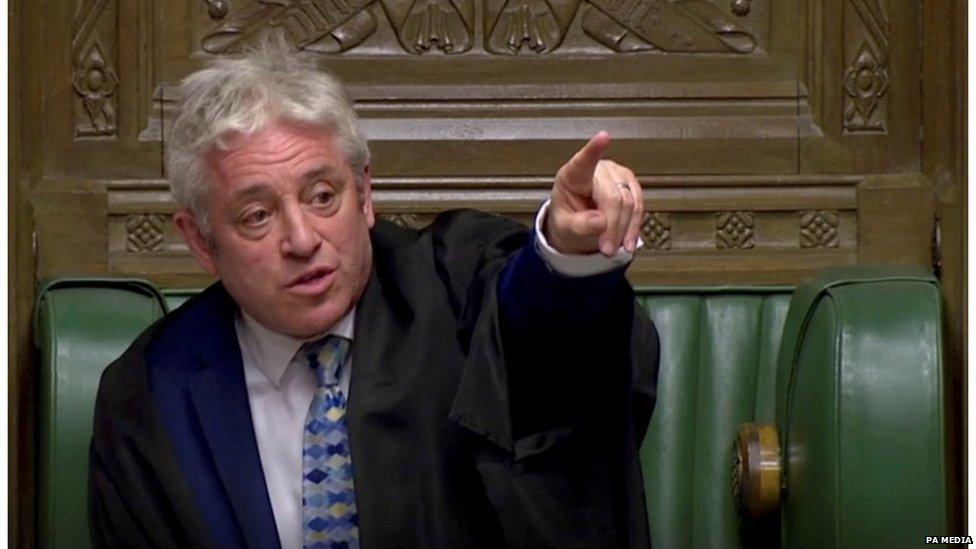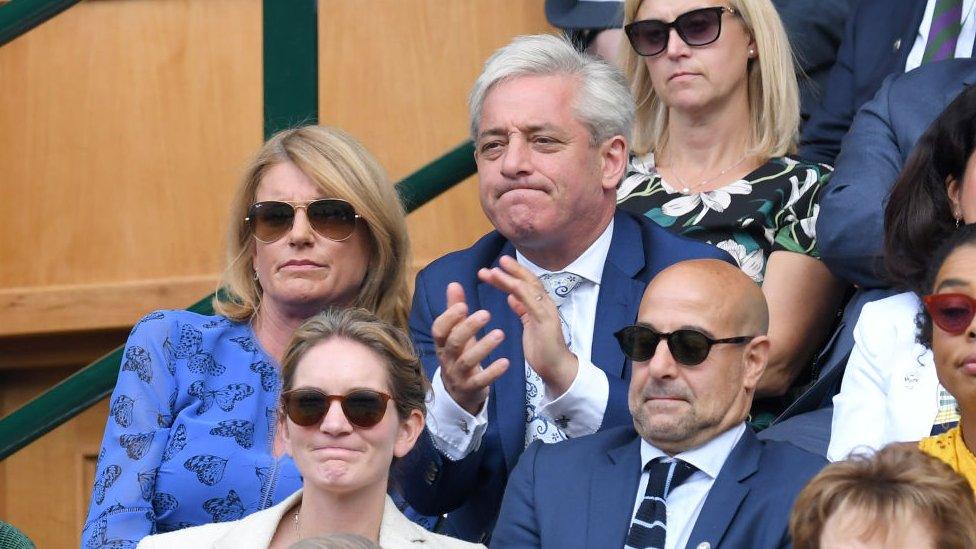Who is Commons Speaker John Bercow?
- Published

John Bercow - who has announced plans to stand down as Commons Speaker - has been a transformative but deeply polarising holder of the historic office.
The former Tory MP, best known for refereeing the weekly Prime Minister's Questions with his shouts of "Order! Order!" has cast himself as the backbenchers' champion - upholding Parliament's reputation and giving MPs unprecedented leeway to scrutinise government and hold ministers to account.
But this has led to accusations of bias - particularly over Brexit - and of creeping egomania, along with suggestions he has ignored or rewritten longstanding parliamentary conventions.
During one of many recent controversies, a former minister said he was the "last person left in Britain who is genuinely accountable to nobody".
In his decade in the Speaker's chair he has clashed with prime ministers, survived attempts to oust him, spoken out against the US president and played a key role as MPs have taken control of Parliament to try and stop a no-deal Brexit.
But he has been under pressure after a damning report last year said bullying and harassment had been condoned in the Commons.
Here are some key things to know about the soon-to-be-ex-MP for Buckingham.
Tennis talent

John Bercow with his wife Sally at Wimbledon
The minicab driver's son first picked up a racquet at the age of eight. He became Middlesex under-12s champion, but later suffered bronchial asthma and was a casual player only thereafter.
He became a member of the Commons tennis team, forming a doubles partnership with future Prime Minister David Cameron.
He even wrote a book on his top 20 male tennis players, his favourite being Switzerland's Roger Federer.
He sometimes plugs his favourite sport in the House of Commons, and is a regular in the Royal Box at Wimbledon.
Political journey
It was as a schoolboy in Finchley, then the constituency of Prime Minister Margaret Thatcher, that Mr Bercow became involved in politics. He joined the right-wing Monday Club, but later left, describing the views of some members as "unpalatable".
At Essex University, Mr Bercow became chairman of the Federation of Conservative Students, an organisation closed down in 1986 by Conservative Party chairman Norman Tebbit because of its radical stances and sometimes raucous behaviour.
The government is defeated over a bid to change the way a future Speaker is elected to the House of Commons
Mr Bercow was elected Conservative MP for Buckingham in 1997. But in the early 2000s his political views altered. He became a champion of gay rights and said a clampdown on cannabis smokers would be "absurd".
After entering the shadow cabinet, he called for Conservative MPs to be banned from membership of the Monday Club.
Having established himself as one of the Conservative Party's most outspoken social liberals, he had to fend off persistent rumours he was poised to defect to Labour.
And his election as Speaker was more popular on the Labour benches than the Conservative ones.
In 2015, with Labour's support, he survived after a proposed rule change that was seen as an attempt to oust him by the Tory government.
Commons traditions
John Bercow: Wearing ties not compulsory
Mr Bercow has said one of his key aims was to make the House of Commons look "marginally less stuffy and forbidding".
This has included allowing male MPs to speak in the chamber without wearing ties, and ending the requirement for Commons clerks - the advisers who sit in front of him - to wear wigs.
This didn't go down too well with some MPs, who said this could undermine Parliament's standing, and ignored tradition.
After becoming Speaker in 2009, he updated his own attire by wearing a business suit, rather than the knee breeches and tights worn by his predecessors.
Keeping order
Order! Order! Speaker shows he runs PMQs
As Speaker, Mr Bercow is in charge of chairing debates and keeping order in the House of Commons. He regularly bemoans the rowdy atmosphere in the chamber, and isn't shy in interrupting people in full flow to tell MPs to calm down.
He has been praised for ensuring backbench MPs get a proper chance to question ministers - and has also had run-ins with several politicians, some of whom think he is a little too fond of his own voice.
Perhaps the most notorious dispute was with Conservative MP Sir Simon Burns, who in 2010 called him a "stupid, sanctimonious dwarf".
Mr Bercow also regularly interrupted former Prime Minister David Cameron and has turned on other ministers, including one who used his phone in the chamber.
The Speaker has found fame across Europe with his signature cry capturing the public's attention
In 2017, he sparked a debate by speaking out against US President Donald Trump being allowed to address Parliament, saying "opposition to racism and sexism" were "hugely important considerations".
This sparked a backlash from from some Conservatives, who accused him of straying beyond his politically-neutral brief.
He also faced claims of bias over Brexit, after he told students in 2017 that he had voted to stay in the EU.
He has dismissed claims he had displayed an anti-Brexit sticker in his car, insisting it belonged to his wife Sally and she was "entitled to her views" as she was "not the chattel of her husband".
Bullying allegations
John Bercow is asked in the Commons about bullying allegations against him
In 2018, the Speaker faced allegations of bullying, which he denies.
His former private secretary, Angus Sinclair, told BBC Newsnight the Speaker shouted and swore at him, and attempted to physically intimidate him.
Another former senior official, David Leakey, said Mr Bercow created a climate of "fear and intimidation".
At the time, his spokesman said there was "no substance" to Mr Sinclair's allegations and that while he had had "fundamental disagreements" with Mr Leakey, they had "interacted adequately after that".
Asked about the allegations in the Commons, Mr Bercow responded: "I have a superb team of dedicated, effective and long-serving staff, five of whom have served me for a collective total of over 40 years.
"I am also happy to confirm that the great majority of people who have left my service have done so on perfectly amicable terms."
His future
Unless an early election is called, which seems unlikely, Mr Bercow has said he will remain in the Speaker's chair until 31 October.
This just happens to be the date the UK is due to leave the EU or, as seems increasingly unlikely, the point at which there is a further delay.
As well as more Brexit machinations and election speculation over the next eight weeks, there will also be another State Opening of Parliament and Queen's Speech - when Boris Johnson will set out his legislative programme - in which Mr Bercow is likely to play a high-profile role.
To use a tennis analogy, this will give Mr Bercow the chance to umpire the Wimbledon, US Open and French Open final before making way.
It is not clear what the future holds for him after his retirement.
But by historical convention, former Speakers can look forward to being given a peerage and elevated to the House of Lords.